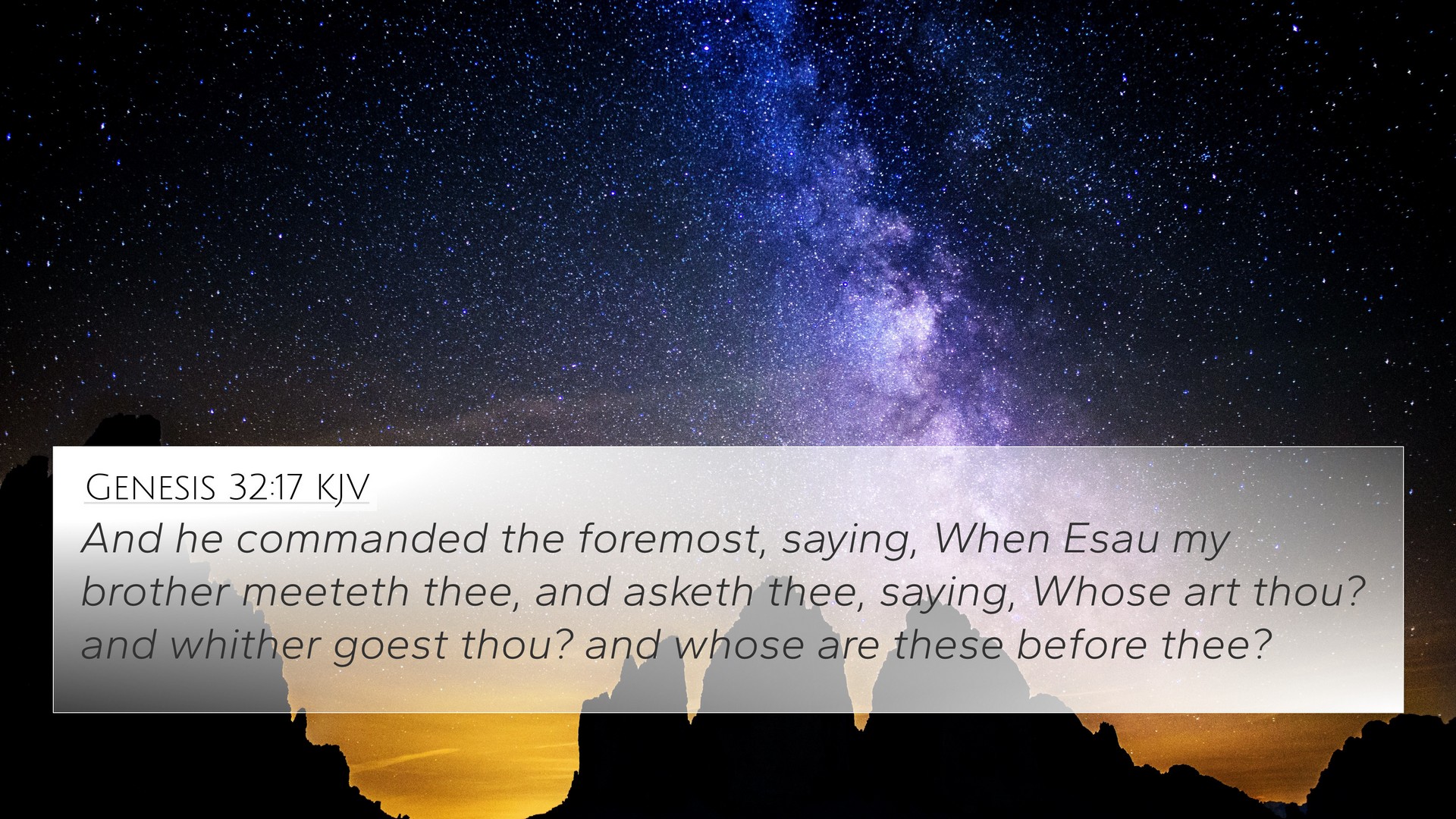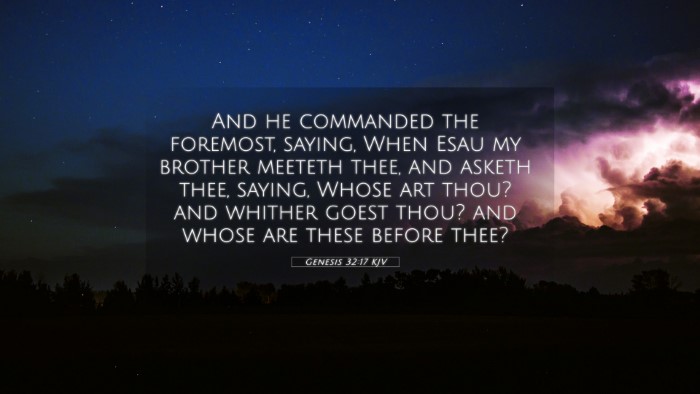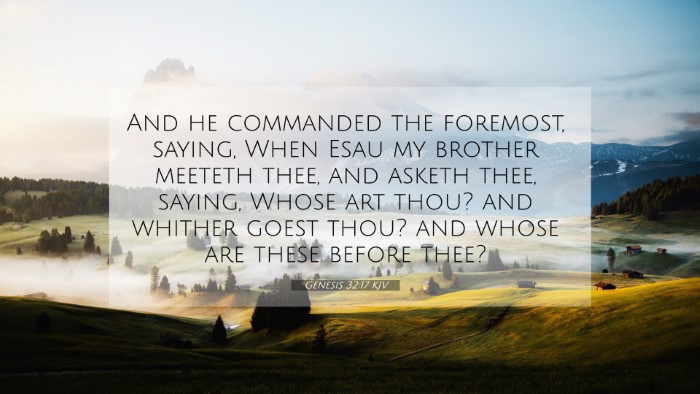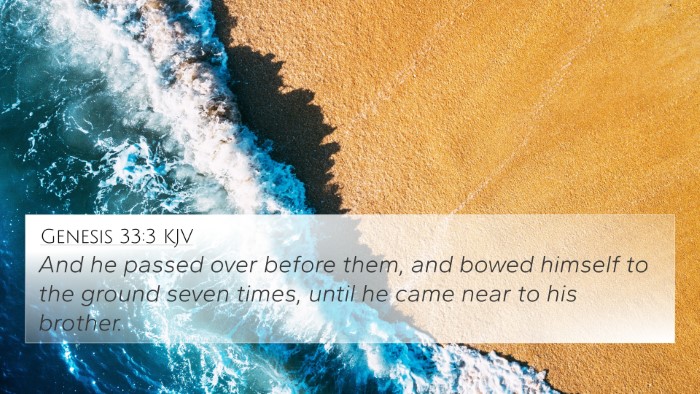Understanding Genesis 32:17
The verse Genesis 32:17 states:
"And he commanded the foremost, saying, When Esau my brother meeteth thee, and asketh thee, saying, Whose art thou? and whither goest thou? and whose are these before thee?"
Verse Context and Overview
Genesis 32:17 takes place during a pivotal moment in Jacob's story, preparing to confront his estranged brother Esau after years of separation. This context is essential for understanding the emotional and relational tension present in this encounter.
Commentary Insights
-
Matthew Henry:
Henry emphasizes the significance of Jacob's preparation and the anxiety he felt about meeting Esau. Jacob's strategic division of his possessions underscores his concern for his family and the hope that some offerings might mitigate potential hostility.
-
Albert Barnes:
Barnes notes that Jacob’s thoughtful instructions to his servants reveal his wisdom and sensitivity. He recognizes the need to approach Esau with honor and care, highlighting the importance of reconciliation over conflict.
-
Adam Clarke:
Clarke elaborates on the interpersonal dynamics at play. Jacob instructs his men to present themselves humbly, reflecting a change in his character from earlier days. Clarke emphasizes this as a significant moment of humility and growth for Jacob.
Key Themes and Applications
This verse encapsulates several core themes relevant to biblical study and personal growth:
- Preparation for Confrontation: Preparing to face unresolved issues in our lives.
- Humility in Relationships: Approaching others with humility can foster reconciliation.
- Responsibility for Actions: Recognizing the effects one's past actions have on relationships.
Bible Verse Cross-References
Genesis 32:17 is interconnected with several other biblical verses, providing a richer understanding through cross-referencing:
- Genesis 25:29-34 - The account of Esau selling his birthright to Jacob, setting the groundwork for future conflicts.
- Genesis 33:1-4 - The actual meeting between Jacob and Esau, showcasing the resolution of their long-standing conflict.
- James 4:10 - "Humble yourselves in the sight of the Lord, and he shall lift you up," reflecting the theme of humility seen in Jacob's actions.
- Matthew 5:9 - "Blessed are the peacemakers: for they shall be called the children of God," aligning with Jacob's need for peace with Esau.
- Romans 12:18 - "If it be possible, as much as lieth in you, live peaceably with all men," mirroring Jacob's efforts to live peaceably with Esau.
- Proverbs 15:1 - "A soft answer turneth away wrath," relevant to Jacob's strategy in addressing Esau.
- Genesis 31:55 - The previous tensions between Jacob and Laban, illustrating Jacob's history of relationship management.
Thematic Bible Verse Connections
The encounter between Jacob and Esau in Genesis 32:17 echoes throughout Scripture, inviting further exploration. These connections could be leveraged for deeper study:
- Covenantal relationships: How promises and conflicts shape community dynamics (e.g., Genesis 15:18).
- Faith amidst fear: Similarities in other narratives where individuals confront their past (e.g., Exodus 3:11).
- Transformational experiences: Jacob's spiritual journey can be linked to themes seen in the New Testament (e.g., 2 Corinthians 5:17).
Tools for Bible Cross-Referencing
To engage with the themes in Genesis 32:17, various tools can aid in cross-referencing:
- Bible Concordance: Helps locate scriptural instances related to specific words or themes.
- Bible Cross-Reference Guide: Provides structured relations between verses for enriched study.
- Cross-reference Bible Study: Engaging with scripture in a thematic manner and witnessing its interconnectedness.
Conclusion
Genesis 32:17 serves as a powerful example of the complex themes of conflict, humility, and reconciliation within Scripture. By utilizing biblical commentaries and engaging with cross-referencing tools, readers can uncover deeper insights and connections throughout the Bible, fostering a more profound understanding of God's word.



